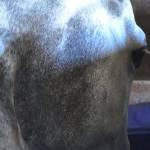Vitamins Are Important in Horse Nutrition

Vitamins are required by the horse for growth, tissue maintenance, body function, and optimum athletic performance. Vitamins are classified as either fat-soluble or water-soluble.
Fat-soluble vitamins (A, D, E, and K) are absorbed with dietary fat and stored in body fat, so they can accumulate in the body if excessive levels are fed. In the case of vitamins A and D, high levels can cause toxicity. Most horses that are fed good-quality feed or spend some time outside in the open will not require extra A, D, or K supplementation. Check the label of your horse feed and if these vitamins are listed, be careful about adding additional vitamin supplements. Never add more than one vitamin A, D, and K supplement to the feed without the advice of a veterinarian or nutritionist.
Carotenes, which are abundant in green forage, are the natural source of vitamin A for the horse. Unfortunately, much of the carotene content is destroyed by oxidation in the process of sun curing, so horses are not able to absorb sufficient quantities of vitamin A from hay to meet their requirement, except possibly from freshly cut good-quality, early bloom alfalfa hay. Performance horses may require higher levels of vitamin A than horses doing less exercise.
Vitamin D is actually a hormone and adequate sunlight results in the production of sufficient vitamin D from 7-dehydrocholesterol in the skin. Hence, vitamin D is not required in the diet if sufficient amounts of sunlight are received. Sufficient vitamin D must be present for calcium and phosphorus to be absorbed, and its deficiency markedly reduces absorption of both minerals. Performance horses housed indoors require 4,300-6,300 IU/day of vitamin D.
Vitamin E is an antioxidant, protecting cell membranes from peroxidative damage. It differs from the other fat-soluble vitamins by not being toxic when fed in large quantities. High levels of vitamin E supplementation (800-1,200 IU/day) may be warranted in horses undergoing strenuous training to help support the horse’s immune system and prevent some of the muscle damage that occurs in the high-level performance horse. Sources of vitamin E include specific vitamin E supplements, wheat germ, and lucerne. Nano-E, a dietary supplement available from Kentucky Equine Research, delivers natural-source vitamin that is highly bioavailable to horses.
The major function of vitamin K is in blood coagulation. Although no requirement has been established, 20 mg/day of vitamin K can be safely added to the ration of a performance horse.
Water-soluble vitamins, such as the B-complex vitamins and ascorbic acid (vitamin C), are not stored in the body to any great extent. These vitamins are either synthesized in the body (vitamin C in the liver from glucose) or produced by the microflora in the large intestine (B vitamins). Because supplemental vitamin C is not absorbed well by the intestine of the horse, high levels have to be fed in order to make an impact on the blood level. Supplementation of B vitamins is probably still warranted for performance horses because they are often given high-grain rations that can compromise the microbial fermentation in the hindgut.
For horses that need a higher level of hoof-related nutrients, Kentucky Equine Research offers Bio-Bloom PS (Bio-Bloom HF in Australia) to provide additional support for hoof quality and growth.








